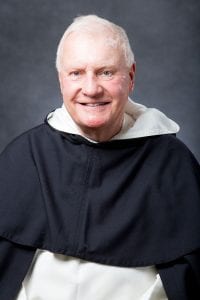The Original Sin of Racism
By Rev. James F. Quigley, O.P. ’60
Some years ago, I occasionally celebrated Mass and assisted in a parish in the South Bronx, New York. Most of the parishioners were Latino and African American. A little old grandmother asked me to give advice to her grandson. Andres was a person of color, spoke Spanish and some English, and was a very friendly young man. Once we got to know each other we would sometimes just shoot baskets in the parish schoolyard and talk.

The time came, however, when I had to leave New York and return to Providence College. I went to the schoolyard to say goodbye to Andres. He asked if we could shoot some baskets. I said my ride was ready and couldn’t. Andres said jokingly, “You white boys can’t shoot anyway.” Teasing, I said: “Andres, you never told me you knew I was white.” He said: “I knew, but I didn’t want to embarrass you.” Andres was a sensitive man to others, accepting differences and respecting persons. I still pray for him.
Bishop Robert Barron ’13Hon. (auxiliary bishop of the Archdiocese of Los Angeles), commenting on events in Charlottesville in a recent video on his blog, Wordonfire.org, states that “racism is America’s original sin.” It has stained our great history and too often infected our souls. Bishop Barron points out that racism, of course, is a political issue as well as an economic, a social, a psychological, and a civil rights issue. But the bishop also notes that, more than anything else, it is a theological issue.
All persons have been created in the image of God. “Let us make man (woman) in our image, after our likeness….” (Genesis 1:26) St. Thomas Aquinas stresses that being made in the imago Dei (image of God) bestows worth and dignity on every person. In that theological vision, any form of discrimination, prejudice, and racial violence against any or all persons is a denial of the imago Dei. It’s idolatry.
Racism can take a variety of forms — brutal acts, harsh and insulting language, crude and uncivil behavior. Such an environment tends to isolate and divide people, feeding fantasies that they may have of each other. Catholic people, Christian people, women and men of religious faith or just good will cannot abide such actions. They are sinful. They ought not be tolerated in our nation, in our Church, in our college. Why? Because Jesus Christ took these sins to his cross and died to free us for a new and different way of relating to each other no matter our differences.
Dr. Martin Luther King Jr. was a civil rights leader and a community organizer. He was a skilled politician and a charismatic motivator. But he was always and before all else a pastor, a theologian. In his last book, Where Do WE Go from Here: Chaos or Community?, he said that civil rights for African Americans and all others were absolutely necessary but not enough. He said that people and Americans had to come together not only around the virtue of justice but also the virtue of charity or love. Only love can shape a mutually respectful, caring, kindly community.
Working toward such a community is the task of everyone. The Catholic community, our institutions, and our programs and policies must take a prophetic posture against racism and every evil that corrupts the Kingdom of God. Pope Francis recently said, “We must overcome all forms of racism, of intolerance, and the instrumentalization of the human person.” We need to pray with courageous faith and confident hope for a better day. That is what we want to and will do here at Providence College. How can we do otherwise and remain true to ourselves? We are … Catholic and Dominican, the Friar family, not just for some but for everyone.
Rev. James F. Quigley, O.P. ’60 is a Providence College National Alumni Association chaplain. He is a former PC associate professor of theology and executive vice president.





